Unit 2 Great people Period 3课件(共38张PPT,含内嵌视频) 牛津译林版英语九年级下册
文档属性
| 名称 | Unit 2 Great people Period 3课件(共38张PPT,含内嵌视频) 牛津译林版英语九年级下册 | 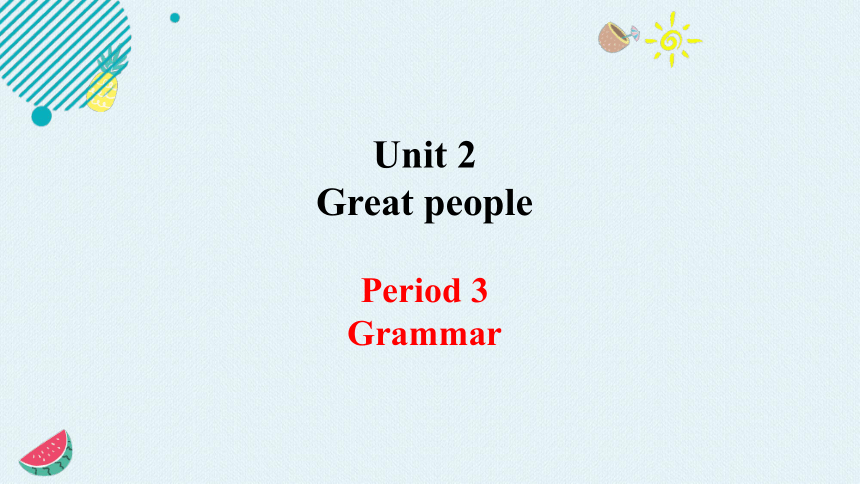 | |
| 格式 | pptx | ||
| 文件大小 | 9.6MB | ||
| 资源类型 | 教案 | ||
| 版本资源 | 牛津译林版 | ||
| 科目 | 英语 | ||
| 更新时间 | 2024-07-21 16:17:57 | ||
图片预览

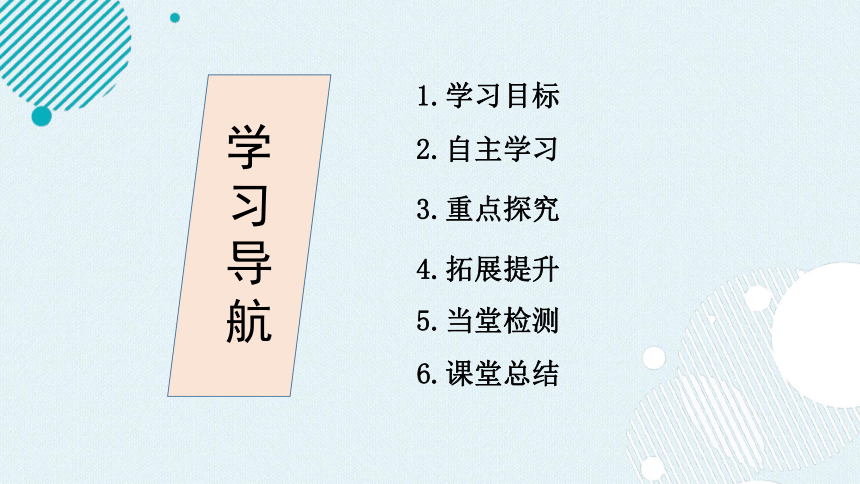


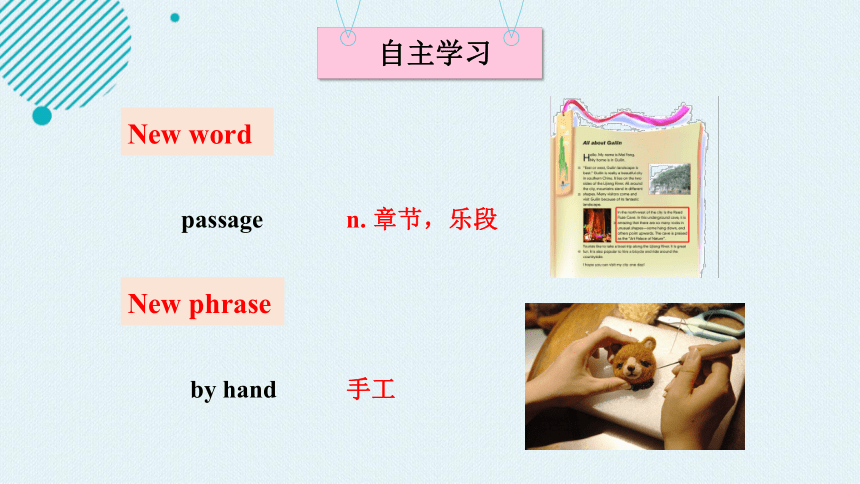
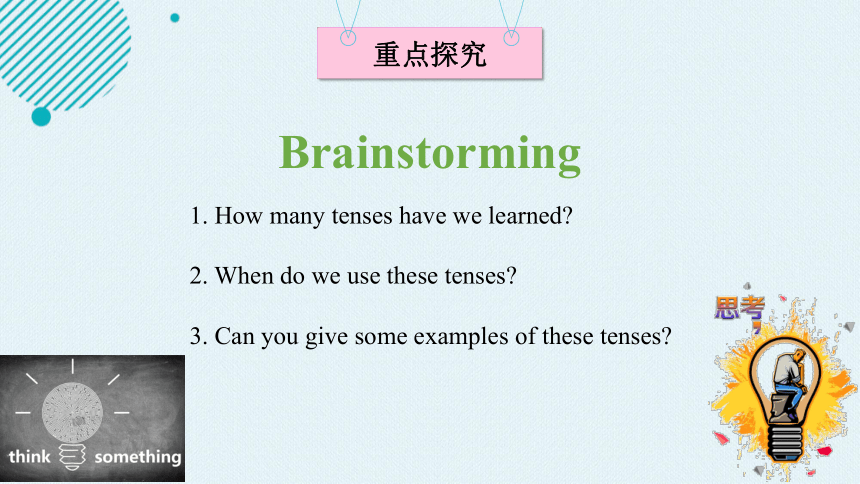
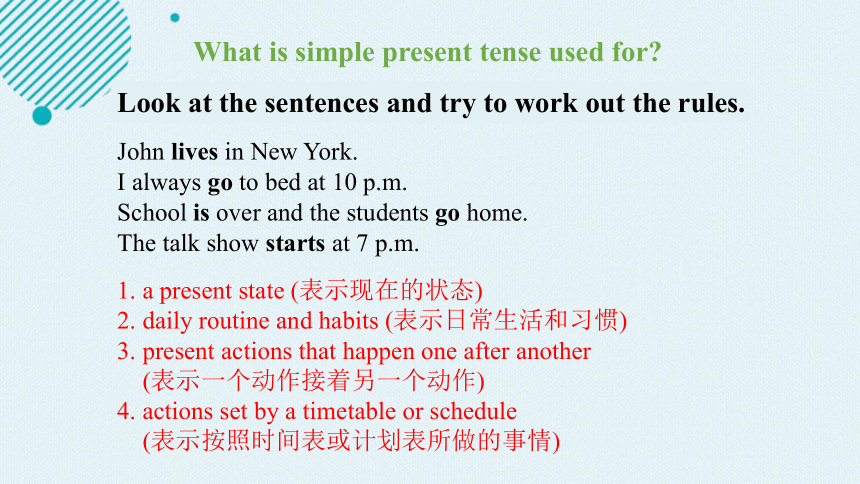
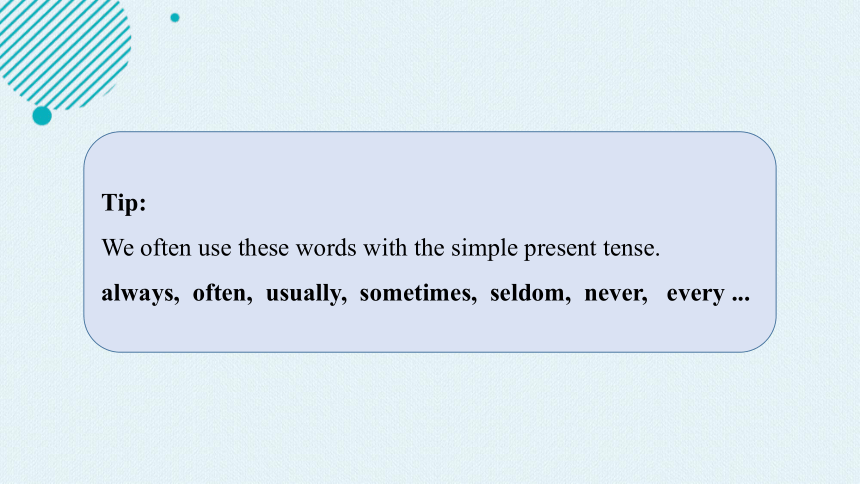
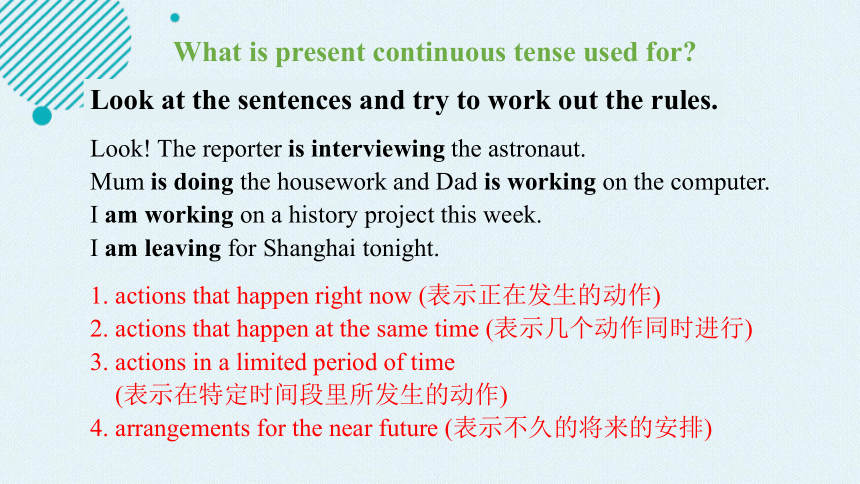
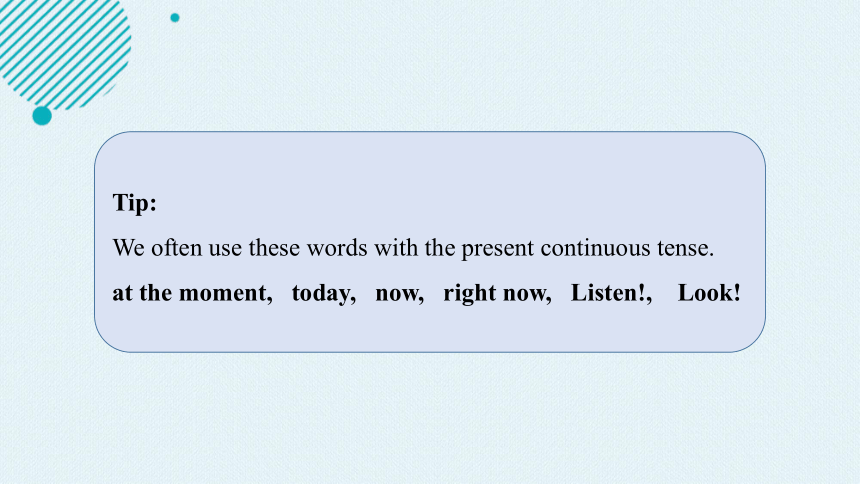
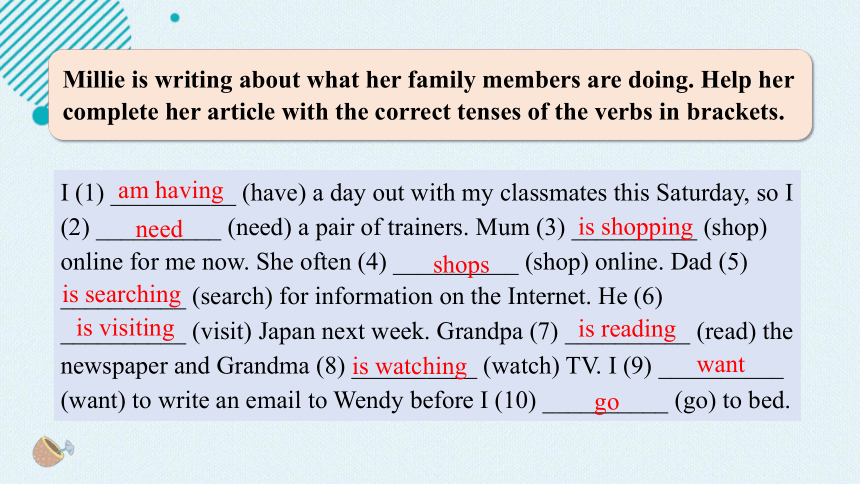
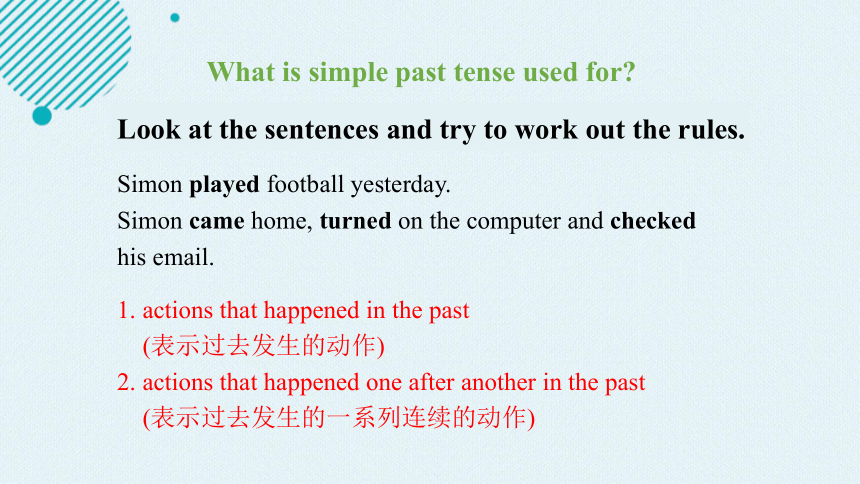
文档简介
(共38张PPT)
Unit 2
Great people
Period 3
Grammar
1.学习目标
3.重点探究
2.自主学习
学习导航
5.当堂检测
6.课堂总结
4.拓展提升
新课导入
Video about tenses
1.能熟悉并正确运用本课时的重点单词和短语。
2.能掌握一般现在时和现在进行时。
3.能掌握一般过去时和过去进行时。
4.能掌握一般过去时和现在完成时。
学习目标
New word
自主学习
passage
n. 章节,乐段
New phrase
by hand
手工
重点探究
Brainstorming
1. How many tenses have we learned
2. When do we use these tenses
3. Can you give some examples of these tenses
Look at the sentences and try to work out the rules.
1. a present state (表示现在的状态)
2. daily routine and habits (表示日常生活和习惯)
3. present actions that happen one after another
(表示一个动作接着另一个动作)
4. actions set by a timetable or schedule
(表示按照时间表或计划表所做的事情)
John lives in New York.
I always go to bed at 10 p.m.
School is over and the students go home.
The talk show starts at 7 p.m.
What is simple present tense used for
Tip:
We often use these words with the simple present tense.
always, often, usually, sometimes, seldom, never, every ...
Look at the sentences and try to work out the rules.
1. actions that happen right now (表示正在发生的动作)
2. actions that happen at the same time (表示几个动作同时进行)
3. actions in a limited period of time
(表示在特定时间段里所发生的动作)
4. arrangements for the near future (表示不久的将来的安排)
Look! The reporter is interviewing the astronaut.
Mum is doing the housework and Dad is working on the computer.
I am working on a history project this week.
I am leaving for Shanghai tonight.
What is present continuous tense used for
Tip:
We often use these words with the present continuous tense.
at the moment, today, now, right now, Listen!, Look!
Millie is writing about what her family members are doing. Help her complete her article with the correct tenses of the verbs in brackets.
I (1) __________ (have) a day out with my classmates this Saturday, so I (2) __________ (need) a pair of trainers. Mum (3) __________ (shop) online for me now. She often (4) __________ (shop) online. Dad (5) __________ (search) for information on the Internet. He (6) __________ (visit) Japan next week. Grandpa (7) __________ (read) the newspaper and Grandma (8) __________ (watch) TV. I (9) __________ (want) to write an email to Wendy before I (10) __________ (go) to bed.
am having
need
shops
is shopping
is searching
is visiting
is reading
is watching
want
go
Look at the sentences and try to work out the rules.
1. actions that happened in the past
(表示过去发生的动作)
2. actions that happened one after another in the past
(表示过去发生的一系列连续的动作)
Simon played football yesterday.
Simon came home, turned on the computer and checked his email.
What is simple past tense used for
Tip:
We often use these words with the simple past tense.
yesterday, ... ago, in 1999, the other day, last ...
Look at the sentences and try to work out the rules.
1. actions that were in progress at a certain time in the past
(表示过去某一时刻正在进行的动作)
2. actions that happened at the same time in the past
(表示过去在同一时间同时发生的动作)
3. actions that lasted for some time in the past
(表示过去的某个时间段内持续发生的动作)
Yesterday at 4 p.m., Simon was playing football.
Simon was playing computer games while Millie was watching TV.
We were having a meeting from 9 a.m. to 11 a.m. yesterday.
What is past continuous tense used for
Tip:
We often use these words with the past continuous tense.
at this time, yesterday, from ... to ..., last night
Simon and his friends are talking about what they did after dinner last plete their conversation with the correct tenses of the verbs in brackets.
Simon: I (1) _____________ (watch) a wonderful football match from 7 p.m. to 8:30 p.m. yesterday. My favourite team (2) _____________ (win) the match.
Millie: I (3) _____________ (write) an email to Wendy at 7 p.m. yesterday. She (4) _____________ (send) me an email last week.
was watching
won
was writing
sent
Sandy: I (5) _____________ (practise) playing the piano the whole night. I (6) _____________ (take) part in a competition this morning.
Peter: Last night, I (7) _____________ (find) a website about travelling in space. I (8) _____________ (read) passages on the website while you (9) _____________ (play) the piano, Sandy.
Daniel: I (10) _____________ (talk) to Aunt Jane on the phone at 7:30 yesterday evening. She (11) _____________ (call) me the day before yesterday, but I (12) _____________ (be not) at home then.
was practising
took
found
was reading
were playing
was talking
called
was not
Look at the sentences and try to work out the rules.
a. actions that happened in the past (表示过去发生的动作)
b. emphasizing the result of a past action
(强调过去动作所产生的结果)
c. actions that happened at a certain time in the past
(表示过去某个时间点发生的动作)
d. telling how many times an action has happened till now
(表示过去某个动作直到现在已经发生了多少次)
a. I bought a new bicycle yesterday.
b. I have bought a new bicycle, so I can ride to school now.
c. Kitty wrote an email to Linda an hour ago.
d. She has been to the USA twice.
Tip:
We often use these words with the present perfect tense.
just, already, up to now, until/till now, ever, (not) yet, so far, recently
Millie is writing about some modern inventions that have changed the way we live. Help her choose the correct words in brackets to complete her article.
Many modern inventions (1) ____________ (made/have made) a great difference in our life. They (2) ____________ (changed/have changed) the way we live.
In ancient times, people (3) ____________ (used/have used) salt to help them keep fish or meat for a longer time. Fresh food would go bad in summer in a few hours. The invention of the fridge (4) ___________ (solved/has solved) this problem.
have made
have changed
used
has solved
In the past, people (5) ____________ (washed/have washed) their clothes by hand. It (6) ____________ (was/has been) tiring, and it (7) ____________ (took/has taken) a lot of time. With the invention of the washing machine, people (8) ____________ (had/have had) more time to relax.
In the old days, people (9) ____________ (travelled/have travelled) by ship. Now planes (10) ____________ (made/have made) journeys more comfortable.
washed
was
took
have had
travelled
have made
拓展提升
Language Points
1. In the past, people washed their clothes by hand.
在过去,人们用手洗衣服。
by hand 手工
e.g. Farm workers milked cows by hand.
农场工人们手工给奶牛挤奶。
时态
我们在初中阶段学过的动词常见时态有以下几种:
1 一般现在时:谓语动词用原形或第三人称单数形式
2 一般过去时:谓语动词用过去式
3 一般将来时:谓语用will/shall/be going to + 动词原形
4 现在进行时:谓语用am/is/are + 动词的现在分词
5 现在完成时:谓语用have/has + 动词的过去分词
6 过去进行时:谓语用was/were + 动词的现在分词
动词主要用来表示动作、状态和性质,而英语中动词的时态是指动作和状态发生的具体时间和表现方式。英语中动词时态用动词的不同形式来表示。
英语中动词的五种基本形式为:动词原形、第三人称单数、现在分词,过去式和过去分词。如:write—writes—writing—wrote—written
一般现在时和现在进行时
我们用一般现在时表示现阶段习惯性、周期性、反复或经常发生的动作,或者用于描述客现真理;我们用现在进行时表示现在正在发生的动作、在现阶段持续发生的动作或存在的状态。如:
I often go to school at 7 a.m. 我经常七点上学。
He is watching TV now. 他正在看电视。
一般现在时表示现在的状态;而现在进行时表示正在发生的动作或状态。如:
I like collecting stamps. 我喜欢集邮。
She is looking after her baby now. 她正在照看她的孩子。
一般现在时表示一个动作接着一个动作,用来描述连续性的事件;而现在进行时表示几个动作同时进行。如:
The bell rings and the students come into class.
铃响了,学生们走进教室。
He is doing his homework and his father is cooking.
他在做作业,他的爸爸在做饭。
一般现在时可以用来描述日常生活和习惯;而现在进行时可以表示在特定时间段里所发生的动作。如:
He always goes home at 6 p.m. 他总是六点回家。
This month he is preparing for the exam. 这个月他在准备考试。
注意:
1 与一般现在时连用的表示频度的状语有always、usually、often、sometimes、seldom、never、on Sunday、every day、every year、once a month、three times a year等。
2 与现在进行时连用的时间状语有at the moment、now、right now等。另外,动词如look、listen用于句首,以唤起对方注意时,也常与现在进行时连用。
一般现在时表示按照时间表或计划表所做的事情;而现在进行时表示即将发生的动作或安排。如:
The class begins at 2 p.m. 这节课两点钟开始。
I am meeting some old friends after school.
放学后我要去见些老朋友。
一般过去时和过去进行时
我们用一般过去时表示在过去发生的动作或存在的状态;我们用过去进行时表示过去的某个时刻正在发生的动作、过去同一时间里同时发生的动作或在过去的某个时间段内持续发生的动作或存在的状态。如:
Two months ago, I flew to London with my mother.
两个月前,我和我妈妈一起坐飞机到伦敦。
I was watching TV from 7 p.m. to 8 p.m. last night.
昨晚七点到八点我在看电视。
一般过去时表示过去发生的动作或者存在的状态;过去进行时强调过去某个时刻发生的动作。如:
He went home by car yesterday. 昨天他开车回家了。
He was shopping at 10 a.m. yesterday. 昨天十点时他正在购物。
一般过去时可以表示过去发生的一系列连续的动作;而过去进行时表示过去同一时间里同时发生的动作。如:
He had dinner and then did his homework.
他吃完晚饭,然后做作业。
She was reading while her mother was talking on the phone.
当她妈妈在打电话的时候,她在看书。
过去进行时还可以表示过去的某个时间段内持续发生的动作或存在的状态。如:
We were playing games the whole afternoon yesterday.
昨天整个下午我们都在玩游戏。
注意:
1 与一般过去时连用的时间状语有yesterday、the day before yesterday、last year、two months ago等;与过去进行时连用的时间状语有at this time yesterday、from ... to ...、last night等。
2 过去进行时通常用while、when连接。
He was sleeping when his father came back.
当他爸爸回来的时候,他在睡觉。
While his mother was doing housework, his sister was playing a game. 当他妈妈在做家务活的时候,他妹妹在玩游戏。
注意:
3 过去进行时也可用来表示过去按计划即将发生的动作。
I was on my way to the sports centre. I was having a swimming lesson there. 我在去体育中心的路上。我将在那里上一节游泳课。
4 过去进行时常与always等频度副词连用,表示过去频繁发生的习惯性动作,此时的过去进行时常带有一定的感彩。
He was always playing computer games when he was in Grade 7.
他上七年级的时候,总是玩电脑游戏。
一般过去时和现在完成时
我们用一般过去时表示在过去发生的动作或存在的状态;我们用现在完成时描述一个发生在过去,并一直延续到现在,或者可能还要延续到将来的动作。如:
She was born in America. 她出生在美国。
I have stayed here for 12 years.
我已经在这里待了十二年。
一般过去时表示过去发生的动作或者存在的状态,现在完成时强调过去动作所产生的结果或影响。如:
He came back home late. 他很晚才回家。
He has already bought two cars. 他已经买了两辆车。
一般过去时表示过去某个时间点发生的动作,而现在完成时表示过去某个动作直到现在已经发生了多少次。如:
He came here two years ago. 他两年前来过这里。
He has been here many times. 他已经来过这里很多次了。
注意:
1 几个副词在现在完成时中的用法:just意为“刚刚”,表示动作刚刚结束,常放在助动词与过去分词之间;ever意为“曾经”,用于疑问句或否定句中,多放在助动词和过去分词之间;never意为“从来没有”,常与before连用,多放在助动词与过去分词之间;before意为“以前”,指过去不确定的某个时候,总是放在句末,不受句型的限制。
2 since与表示时间点的时间状语连用;for与表示时间段的时间状语连用,如:
It has been two weeks since I came here. 我来这里已经有两周了。 I have been here for two weeks. 我来这里已经有两周了。
3 现在完成时中注意延续性动词和非延续性动词的区别。如:
非延续性动词 延续性动词
buy have
borrow keep
open be open
close be closed
begin be on
非延续性动词 延续性动词
come be here
go be there
finish be over
die be dead
注意:现在完成时不可以与yesterday、last week、two days ago等表示过去的时间状语连用(since ...除外)。
当堂检测
根据今日所学,用所给动词的适当形式填空。
1. He with his friends ______________ (lie) in the sun and feeling relaxed on the beach when the tsunami (海啸) came.
2. —Hi, Mary! Look at your shoes. They're worn out.
—Oh, thanks for reminding me. I ______________ (not notice) that.
3. —Jane, I can't find Mike in the playground.
—Oh, he ______________ (play) the piano in the music room.
4. Listening to his useless chatting really ______________ (test) my patience. I won't chat with him again.
5.—Is there any mistake in your homework, Jim
—I'm not sure. I ______________ (not check) it so far.
was lying
didn't notice
is playing
tests
haven't checked
课堂总结
重点单词和短语:
passage, by hand
一般现在时和现在进行时:
前者表示现阶段习惯性、周期性、反复或经常发生的动作,或者用于描述________;后者表示现在_________的动作、在现阶段持续发生的动作或存在的状态。
一般过去时和过去进行时:
前者表示在________发生的动作或存在的状态;后者表示过去的某个时刻__________的动作、过去同一时间里同时发生的动作或在过去的某个时间段内持续发生的动作或存在的状态。
一般过去时和现在完成时:
前者表示在过去发生的动作或存在的状态,后者描述一个发生在过去,并一直延续到__________,或者可能还要延续到_________的动作。
Unit 2
Period 3
客现真理
正在发生
过去
正在发生
现在
将来
Unit 2
Great people
Period 3
Grammar
1.学习目标
3.重点探究
2.自主学习
学习导航
5.当堂检测
6.课堂总结
4.拓展提升
新课导入
Video about tenses
1.能熟悉并正确运用本课时的重点单词和短语。
2.能掌握一般现在时和现在进行时。
3.能掌握一般过去时和过去进行时。
4.能掌握一般过去时和现在完成时。
学习目标
New word
自主学习
passage
n. 章节,乐段
New phrase
by hand
手工
重点探究
Brainstorming
1. How many tenses have we learned
2. When do we use these tenses
3. Can you give some examples of these tenses
Look at the sentences and try to work out the rules.
1. a present state (表示现在的状态)
2. daily routine and habits (表示日常生活和习惯)
3. present actions that happen one after another
(表示一个动作接着另一个动作)
4. actions set by a timetable or schedule
(表示按照时间表或计划表所做的事情)
John lives in New York.
I always go to bed at 10 p.m.
School is over and the students go home.
The talk show starts at 7 p.m.
What is simple present tense used for
Tip:
We often use these words with the simple present tense.
always, often, usually, sometimes, seldom, never, every ...
Look at the sentences and try to work out the rules.
1. actions that happen right now (表示正在发生的动作)
2. actions that happen at the same time (表示几个动作同时进行)
3. actions in a limited period of time
(表示在特定时间段里所发生的动作)
4. arrangements for the near future (表示不久的将来的安排)
Look! The reporter is interviewing the astronaut.
Mum is doing the housework and Dad is working on the computer.
I am working on a history project this week.
I am leaving for Shanghai tonight.
What is present continuous tense used for
Tip:
We often use these words with the present continuous tense.
at the moment, today, now, right now, Listen!, Look!
Millie is writing about what her family members are doing. Help her complete her article with the correct tenses of the verbs in brackets.
I (1) __________ (have) a day out with my classmates this Saturday, so I (2) __________ (need) a pair of trainers. Mum (3) __________ (shop) online for me now. She often (4) __________ (shop) online. Dad (5) __________ (search) for information on the Internet. He (6) __________ (visit) Japan next week. Grandpa (7) __________ (read) the newspaper and Grandma (8) __________ (watch) TV. I (9) __________ (want) to write an email to Wendy before I (10) __________ (go) to bed.
am having
need
shops
is shopping
is searching
is visiting
is reading
is watching
want
go
Look at the sentences and try to work out the rules.
1. actions that happened in the past
(表示过去发生的动作)
2. actions that happened one after another in the past
(表示过去发生的一系列连续的动作)
Simon played football yesterday.
Simon came home, turned on the computer and checked his email.
What is simple past tense used for
Tip:
We often use these words with the simple past tense.
yesterday, ... ago, in 1999, the other day, last ...
Look at the sentences and try to work out the rules.
1. actions that were in progress at a certain time in the past
(表示过去某一时刻正在进行的动作)
2. actions that happened at the same time in the past
(表示过去在同一时间同时发生的动作)
3. actions that lasted for some time in the past
(表示过去的某个时间段内持续发生的动作)
Yesterday at 4 p.m., Simon was playing football.
Simon was playing computer games while Millie was watching TV.
We were having a meeting from 9 a.m. to 11 a.m. yesterday.
What is past continuous tense used for
Tip:
We often use these words with the past continuous tense.
at this time, yesterday, from ... to ..., last night
Simon and his friends are talking about what they did after dinner last plete their conversation with the correct tenses of the verbs in brackets.
Simon: I (1) _____________ (watch) a wonderful football match from 7 p.m. to 8:30 p.m. yesterday. My favourite team (2) _____________ (win) the match.
Millie: I (3) _____________ (write) an email to Wendy at 7 p.m. yesterday. She (4) _____________ (send) me an email last week.
was watching
won
was writing
sent
Sandy: I (5) _____________ (practise) playing the piano the whole night. I (6) _____________ (take) part in a competition this morning.
Peter: Last night, I (7) _____________ (find) a website about travelling in space. I (8) _____________ (read) passages on the website while you (9) _____________ (play) the piano, Sandy.
Daniel: I (10) _____________ (talk) to Aunt Jane on the phone at 7:30 yesterday evening. She (11) _____________ (call) me the day before yesterday, but I (12) _____________ (be not) at home then.
was practising
took
found
was reading
were playing
was talking
called
was not
Look at the sentences and try to work out the rules.
a. actions that happened in the past (表示过去发生的动作)
b. emphasizing the result of a past action
(强调过去动作所产生的结果)
c. actions that happened at a certain time in the past
(表示过去某个时间点发生的动作)
d. telling how many times an action has happened till now
(表示过去某个动作直到现在已经发生了多少次)
a. I bought a new bicycle yesterday.
b. I have bought a new bicycle, so I can ride to school now.
c. Kitty wrote an email to Linda an hour ago.
d. She has been to the USA twice.
Tip:
We often use these words with the present perfect tense.
just, already, up to now, until/till now, ever, (not) yet, so far, recently
Millie is writing about some modern inventions that have changed the way we live. Help her choose the correct words in brackets to complete her article.
Many modern inventions (1) ____________ (made/have made) a great difference in our life. They (2) ____________ (changed/have changed) the way we live.
In ancient times, people (3) ____________ (used/have used) salt to help them keep fish or meat for a longer time. Fresh food would go bad in summer in a few hours. The invention of the fridge (4) ___________ (solved/has solved) this problem.
have made
have changed
used
has solved
In the past, people (5) ____________ (washed/have washed) their clothes by hand. It (6) ____________ (was/has been) tiring, and it (7) ____________ (took/has taken) a lot of time. With the invention of the washing machine, people (8) ____________ (had/have had) more time to relax.
In the old days, people (9) ____________ (travelled/have travelled) by ship. Now planes (10) ____________ (made/have made) journeys more comfortable.
washed
was
took
have had
travelled
have made
拓展提升
Language Points
1. In the past, people washed their clothes by hand.
在过去,人们用手洗衣服。
by hand 手工
e.g. Farm workers milked cows by hand.
农场工人们手工给奶牛挤奶。
时态
我们在初中阶段学过的动词常见时态有以下几种:
1 一般现在时:谓语动词用原形或第三人称单数形式
2 一般过去时:谓语动词用过去式
3 一般将来时:谓语用will/shall/be going to + 动词原形
4 现在进行时:谓语用am/is/are + 动词的现在分词
5 现在完成时:谓语用have/has + 动词的过去分词
6 过去进行时:谓语用was/were + 动词的现在分词
动词主要用来表示动作、状态和性质,而英语中动词的时态是指动作和状态发生的具体时间和表现方式。英语中动词时态用动词的不同形式来表示。
英语中动词的五种基本形式为:动词原形、第三人称单数、现在分词,过去式和过去分词。如:write—writes—writing—wrote—written
一般现在时和现在进行时
我们用一般现在时表示现阶段习惯性、周期性、反复或经常发生的动作,或者用于描述客现真理;我们用现在进行时表示现在正在发生的动作、在现阶段持续发生的动作或存在的状态。如:
I often go to school at 7 a.m. 我经常七点上学。
He is watching TV now. 他正在看电视。
一般现在时表示现在的状态;而现在进行时表示正在发生的动作或状态。如:
I like collecting stamps. 我喜欢集邮。
She is looking after her baby now. 她正在照看她的孩子。
一般现在时表示一个动作接着一个动作,用来描述连续性的事件;而现在进行时表示几个动作同时进行。如:
The bell rings and the students come into class.
铃响了,学生们走进教室。
He is doing his homework and his father is cooking.
他在做作业,他的爸爸在做饭。
一般现在时可以用来描述日常生活和习惯;而现在进行时可以表示在特定时间段里所发生的动作。如:
He always goes home at 6 p.m. 他总是六点回家。
This month he is preparing for the exam. 这个月他在准备考试。
注意:
1 与一般现在时连用的表示频度的状语有always、usually、often、sometimes、seldom、never、on Sunday、every day、every year、once a month、three times a year等。
2 与现在进行时连用的时间状语有at the moment、now、right now等。另外,动词如look、listen用于句首,以唤起对方注意时,也常与现在进行时连用。
一般现在时表示按照时间表或计划表所做的事情;而现在进行时表示即将发生的动作或安排。如:
The class begins at 2 p.m. 这节课两点钟开始。
I am meeting some old friends after school.
放学后我要去见些老朋友。
一般过去时和过去进行时
我们用一般过去时表示在过去发生的动作或存在的状态;我们用过去进行时表示过去的某个时刻正在发生的动作、过去同一时间里同时发生的动作或在过去的某个时间段内持续发生的动作或存在的状态。如:
Two months ago, I flew to London with my mother.
两个月前,我和我妈妈一起坐飞机到伦敦。
I was watching TV from 7 p.m. to 8 p.m. last night.
昨晚七点到八点我在看电视。
一般过去时表示过去发生的动作或者存在的状态;过去进行时强调过去某个时刻发生的动作。如:
He went home by car yesterday. 昨天他开车回家了。
He was shopping at 10 a.m. yesterday. 昨天十点时他正在购物。
一般过去时可以表示过去发生的一系列连续的动作;而过去进行时表示过去同一时间里同时发生的动作。如:
He had dinner and then did his homework.
他吃完晚饭,然后做作业。
She was reading while her mother was talking on the phone.
当她妈妈在打电话的时候,她在看书。
过去进行时还可以表示过去的某个时间段内持续发生的动作或存在的状态。如:
We were playing games the whole afternoon yesterday.
昨天整个下午我们都在玩游戏。
注意:
1 与一般过去时连用的时间状语有yesterday、the day before yesterday、last year、two months ago等;与过去进行时连用的时间状语有at this time yesterday、from ... to ...、last night等。
2 过去进行时通常用while、when连接。
He was sleeping when his father came back.
当他爸爸回来的时候,他在睡觉。
While his mother was doing housework, his sister was playing a game. 当他妈妈在做家务活的时候,他妹妹在玩游戏。
注意:
3 过去进行时也可用来表示过去按计划即将发生的动作。
I was on my way to the sports centre. I was having a swimming lesson there. 我在去体育中心的路上。我将在那里上一节游泳课。
4 过去进行时常与always等频度副词连用,表示过去频繁发生的习惯性动作,此时的过去进行时常带有一定的感彩。
He was always playing computer games when he was in Grade 7.
他上七年级的时候,总是玩电脑游戏。
一般过去时和现在完成时
我们用一般过去时表示在过去发生的动作或存在的状态;我们用现在完成时描述一个发生在过去,并一直延续到现在,或者可能还要延续到将来的动作。如:
She was born in America. 她出生在美国。
I have stayed here for 12 years.
我已经在这里待了十二年。
一般过去时表示过去发生的动作或者存在的状态,现在完成时强调过去动作所产生的结果或影响。如:
He came back home late. 他很晚才回家。
He has already bought two cars. 他已经买了两辆车。
一般过去时表示过去某个时间点发生的动作,而现在完成时表示过去某个动作直到现在已经发生了多少次。如:
He came here two years ago. 他两年前来过这里。
He has been here many times. 他已经来过这里很多次了。
注意:
1 几个副词在现在完成时中的用法:just意为“刚刚”,表示动作刚刚结束,常放在助动词与过去分词之间;ever意为“曾经”,用于疑问句或否定句中,多放在助动词和过去分词之间;never意为“从来没有”,常与before连用,多放在助动词与过去分词之间;before意为“以前”,指过去不确定的某个时候,总是放在句末,不受句型的限制。
2 since与表示时间点的时间状语连用;for与表示时间段的时间状语连用,如:
It has been two weeks since I came here. 我来这里已经有两周了。 I have been here for two weeks. 我来这里已经有两周了。
3 现在完成时中注意延续性动词和非延续性动词的区别。如:
非延续性动词 延续性动词
buy have
borrow keep
open be open
close be closed
begin be on
非延续性动词 延续性动词
come be here
go be there
finish be over
die be dead
注意:现在完成时不可以与yesterday、last week、two days ago等表示过去的时间状语连用(since ...除外)。
当堂检测
根据今日所学,用所给动词的适当形式填空。
1. He with his friends ______________ (lie) in the sun and feeling relaxed on the beach when the tsunami (海啸) came.
2. —Hi, Mary! Look at your shoes. They're worn out.
—Oh, thanks for reminding me. I ______________ (not notice) that.
3. —Jane, I can't find Mike in the playground.
—Oh, he ______________ (play) the piano in the music room.
4. Listening to his useless chatting really ______________ (test) my patience. I won't chat with him again.
5.—Is there any mistake in your homework, Jim
—I'm not sure. I ______________ (not check) it so far.
was lying
didn't notice
is playing
tests
haven't checked
课堂总结
重点单词和短语:
passage, by hand
一般现在时和现在进行时:
前者表示现阶段习惯性、周期性、反复或经常发生的动作,或者用于描述________;后者表示现在_________的动作、在现阶段持续发生的动作或存在的状态。
一般过去时和过去进行时:
前者表示在________发生的动作或存在的状态;后者表示过去的某个时刻__________的动作、过去同一时间里同时发生的动作或在过去的某个时间段内持续发生的动作或存在的状态。
一般过去时和现在完成时:
前者表示在过去发生的动作或存在的状态,后者描述一个发生在过去,并一直延续到__________,或者可能还要延续到_________的动作。
Unit 2
Period 3
客现真理
正在发生
过去
正在发生
现在
将来
